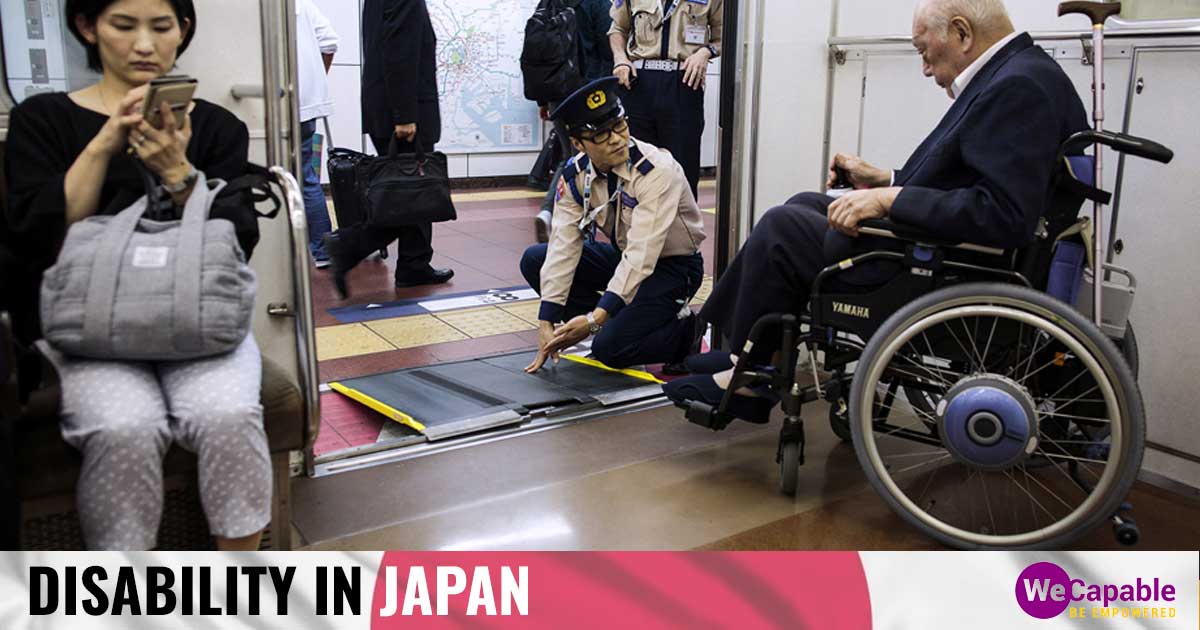Japan, an archipelago country, is one of the most literate and technically advanced nations in the world. Despite its small size, it is the third-largest economy in the world. In a nutshell, Japan has literacy, financial resource and technology… all the things required for a country to support its citizens with disabilities to lead a dignified life as every other member of the society. Let us see how much Japan has been able to utilize the ingredients of development for its citizens with disabilities.
Definition of Disability in Japan
Disability in Japan is defined under the Disabled Person’s Fundamental Law. Section 2 of this Law defines Persons with Disabilities as –
“Individuals who are subject to considerable restrictions in vocational life, or who have great difficulty in leading a vocational life, over a long period of time because of any physical, intellectual and mental (including developmental) disabilities or impairment”.
It is worth noting that any person with the above-mentioned condition cannot be automatically treated as a person with a disability for legal purposes in Japan. The person needs to be certified by the governor of the local public body. The certification of disability in Japan is given in the form of a booklet which is called ‘disability passbook’. Persons holding a ‘disability passbook’ are allowed financial aid and a reduced rate of fare in public transportation. This disability passbook needs to be renewed every year or in other words, people with disabilities in Japan need re-certification for their disability every year.
Laws and Legislation Regarding Disability in Japan
1. Disabled Persons’ Fundamental Law
As the name suggests, this is the fundamental or basic law regarding measures for disabled people. The law designates responsibilities for the government and people towards citizens with disabilities in Japan.
The law states that the dignity of all disabled people should be respected and they should be given full opportunities to participate in society. The state and local public bodies are made responsible by the law to take welfare measures for persons with disabilities. Moreover, the law requires a disabled person to endeavor to participate in society and family members are expected to promote the independence of the disabled person.
2. Law for Encouragement of School Attendance at Special Schools for Blind Persons, Deaf Persons, Physically Disabled Persons and Mentally Retarded Persons
The law is meant for promoting education for children with special needs. Children with special needs, enrolled in such special schools, are supported by the government through provisions of books, meals and transportation. The Law mentions people with blindness, the deaf persons, Physically Disabled Persons and Mentally Retarded Persons.

3. Law for Employment Promotion, etc. of the Disabled Persons
This Act is meant for promoting employment opportunities for Persons with Disabilities. Persons with a mild degree of disability or minor restrictions are not covered under the law. It provides a quota for the public as well as private entities. Disabled employees, employed under the quota must recertify their disability or they won’t be counted under the disabled quota and may lose their job.
Employers cannot discriminate against a person with disabilities at the workplace. They are now also required to make reasonable accommodation for employees with disabilities which in some cases can be covered under government allowances.
The law allows the government to collect levies from employers who fail to employ the required number of persons with disabilities must use the fund to support and promote entities that employ persons with disabilities in excess of the required quota.
In addition to the above-mentioned laws, there are other specific laws for the development and welfare of persons with physical disabilities and persons with mental disabilities.
Social Status of People with Disabilities in Japan
The most striking feature of Japanese society when it comes to disability is the tendency to ‘segregate’ or ‘exclude’. Even though people with disabilities are equal in the eyes of the law, the actual treatment shows that they are considered unfit or unworthy to participate equally with their non-disabled counterparts.
Segregation starts at the school level. Primary as well as secondary schools in Japan are largely non-inclusive. Classroom segregation, for disabled and non-disabled students, is a very common practice. Even the quota system for employment of persons with disabilities provides an option to employers for creating a special barrier-free subsidiary company. In such subsidiaries all employees with disabilities work in group settings and they will be counted towards the parent company’s disability employment quota.
Japan has shown satisfactory development in creating barrier-free infrastructure but failed to remove attitudinal barriers. For example, there exist facilities like universal design barrier-free taxis. However, a large number of individuals with disabilities are reportedly refused service by the drivers.
Use the citation below to add this article to your bibliography
"Disability in Japan: Laws, Rights, Discrimination and Stigma." Wecapable.com. Web. May 25, 2025. <https://wecapable.com/disability-in-japan-laws-rights-discrimination-and-stigma/>
Wecapable.com, "Disability in Japan: Laws, Rights, Discrimination and Stigma." Accessed May 25, 2025. https://wecapable.com/disability-in-japan-laws-rights-discrimination-and-stigma/
"Disability in Japan: Laws, Rights, Discrimination and Stigma." (n.d.). Wecapable.com. Retrieved May 25, 2025 from https://wecapable.com/disability-in-japan-laws-rights-discrimination-and-stigma/

Leave a Reply